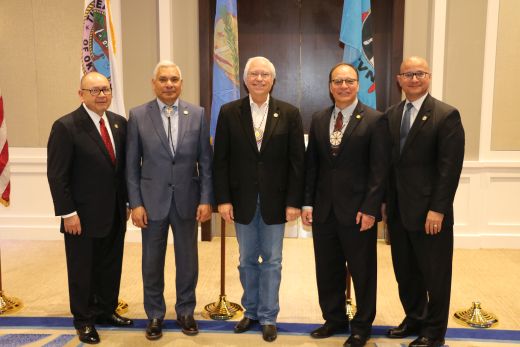Inter-Tribal Council spearheads Stigler Act changes

This article appeared in the February 2019 edition of the Chickasaw Times
TULSA, Okla. – Indian families will now have a streamlined and efficient way to manage family property thanks in part to efforts by the Inter-Tribal Council of the Five Civilized Tribes.
During its January 11 quarterly meeting, the council passed a resolution commending the leadership of the Oklahoma delegation to the 115th U.S. Congress for its support of amendments to the Stigler Act. The Act governs inheritance and transfer of much Indian-owned property.
“These amendments restore some land rights that were taken away from the Chickasaws, Choctaws, Cherokees, Creeks and Seminoles back in 1947,” Gov. Bill Anoatubby said. “It’s going to help our citizens maintain control of their land, which could have been in their family for generations.”
Speaking prior to the council voting on the resolutions, Muscogee (Creek) Nation Principal Chief James Floyd said he believed the Inter-Tribal Council’s unity helped win key legislative victories.
“We all carried the same message,” Principal Chief Floyd said. “We got (amendments to the Stigler Act) passed and signed into law – a great accomplishment there.”
The Stigler Act of 1947 prevented tribal citizens with less than 50 percent blood quantum from inheriting non-taxable status on Dawes Commission allotted land.
The amendments to the Stigler Act remove the requirement that an individual inheriting land originally allotted to members of the Five Civilized Tribes must have 50 percent Native American blood from one of the five tribes in order for the land to remain in restricted fee status. The amendment allows all members of the Five Civilized Tribes who hold family allotments to retain their land in trust status, if they choose. Prior to the amendment, families were often forced to split land into smaller tracts to be sold.
Additionally, Chief Floyd said The JOM Modernization Act was another welcome legislative success.
The Johnson-O’Malley Supplemental Indian Education Program Modernization Act requires the U.S. Department of the Interior to update the count of Native American students eligible for the JOM Program annually. The JOM Program awards contracts to support the needs of Native American students.
Contract amounts are based on the number of students served, so the updated numbers would be reflected more regularly in the contracts.
The Principal Chief Floyd thanked council staff and tribal employees for their work in preparing documents and information to share with the federal government.
“It really sets the stage for a lot of good things in the future,” he said.
The council also passed a resolution calling for restoration of federal government operations and funding of tribal programs.
Tribal leaders said the recent partial federal government shutdown had been disruptive and they hoped the federal government would soon resume its regular functions.
“We’re continuing to provide services to our tribal members,” Choctaw Nation of Oklahoma Chief Gary Batton said.
Gov. Anoatubby said the Chickasaw Nation was continuing its operations.
“We are continuing with business as usual using available funding to operate federal programs,” he said. “We will continue to monitor the situation.”
“I hope there’s a resolution and calmer heads will prevail,” Cherokee Nation Principal Chief Bill John Baker said.
In other business, members of the council voted for Seminole Nation of Oklahoma Chief Greg Chilcoat and Gov. Anoatubby to serve as the council’s new president and vice president, respectively, in a routine changing of officers.
Chief Baker and Chief Chilcoat were the previous officers for the Inter-Tribal Council.
“It has been such an honor and a privilege to be among you, to work for you, to work with you and to work with these other leaders,” Chief Baker said.
The regular quarterly meeting was hosted by the Seminole Nation in partnership with the Muscogee (Creek) Nation at the River Spirit Casino Resort Hotel in Tulsa.
Nine resolutions were approved by the council. The other seven resolutions were as follows:
- A resolution urging Congress to pass H.R.-195, the Pay our Doctors Act of 2019.
- A resolution in support of an Oklahoma state bill to change the date of Native American Day to the second Monday of October.
- A resolution to support the integration of tribal affiliation data and culturally responsive professional development into the Oklahoma State Department of Education.
- A resolution in support of the Native American Finance Officers Association and their comments and recommendations to the IRS regarding opportunity zones in Indian Country.
- A resolution commending and congratulating Cherokee Kevin Stitt on his election as Governor of Oklahoma.
- A resolution in support of enacting legislation to ensure Medicaid fulfills the federal trust responsibility to American Indians/Alaska Natives.
- A resolution supporting the Indian Child Welfare Act of 1978 and objecting to the Brackeen v. Zinke decision.